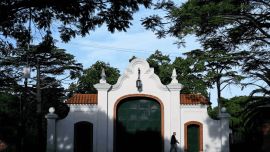Argentina’s latest talks with the International Monetary Fund are getting under way with an agenda that looks modest by comparison with the grand ambitions that defined their past dealings.
Given how those deals turned out, that may be just as well.
It’s only two years since the IMF broke its own credit records by offering Argentina US$57 billion. The goal was to help a market-friendly government battle recession – and write an upbeat chapter in what’s been an acrimonious borrower-lender history. But hardly anything went as planned.
The IMF programme collapsed, the economy slid into an even deeper hole, and Argentina defaulted on its debt for the ninth time. Bondholders had to settle last month for 55 cents on the dollar.
Voters, meanwhile, kicked out the politicians who borrowed all the money, and elected a Peronist administration that says it won’t seek additional cash from the Fund. If that position holds, the country’s 22nd IMF programme will essentially be a refinancing agreement for the US$44 billion it already owes.
‘The Fund sees’
Argentina will still be required to make commitments, like reining in its budget deficit. But with governments everywhere relying on fiscal spending to cushion the blow of the pandemic, the IMF likely won’t push too hard on that front, according to Claudio Loser, a former IMF director.
“The Fund isn’t going to say ‘austerity immediately,’ which is always Argentina’s concern,” he said. “The Fund sees what’s happening in the world.”
Argentina has imposed some of Latin America’s strictest lockdowns. Its economy is forecast to shrink a record 12 percent this year, and its budget deficit to widen to about eight percent of GDP.
Since it can’t borrow abroad, Argentina has been printing money to finance the pandemic spending -– helping keep inflation above 40 percent. The government has responded by freezing the price of services like mobile phones and Internet. And it’s proposing to raise funds for the budget with a one-time wealth tax on millionaires.
‘By the facts’
Those policies may turn into sticking points during the IMF talks, where regaining access to markets and bringing inflation under control will be key topics. Another will be how to lift the capital controls that Argentina imposed over the past year or so to shore up its currency.
“I don’t imagine the IMF asking Argentina to lift capital controls starting tomorrow,” Sergio Chodos, the nation’s representative to the Fund, said in an August interview. “That path will be determined by the facts, not by a timetable.”
What will require a timetable is Argentina’s repayments to the Fund, which as things stand are all due by 2023. The top priority for President Alberto Fernández’s government is to negotiate more breathing space.
But the Fund has reasons to want its money back quickly, amid a surge in loan requests. More than 100 countries have reached out during the pandemic.
“The IMF is oversubscribed now, never in its history had so many programmes,” said Stephen Nelson, a political scientist at Northwestern University. “That’s an issue on how generous the IMF can be with Argentina.”
‘How can we get money?’
The backdrop for any talks between Argentina and the Fund is a legacy of mutual hostility and mistrust that goes beyond the failed 2018 agreement.
Almost two decades earlier, the collapse of another big IMF loan programme had plunged the economy into a deep slump. The left-leaning government that came to power after that crisis paid all its outstanding debt to the Fund at once, so that it could cut off ties, and the IMF shut down its office in Buenos Aires.
Over the years there’s been plenty of blame, and some self-examination too.
Teresa Ter-Minassian, who was a IMF mission chief in Argentina during the late 1990s, said the country’s leaders weren’t genuinely committed to the measures they had promised to take.
“I always worried that the political class did not own the programme,” she said. “Their approach was, ‘How can we get money from the IMF?’ rather than, ‘How can we implement the policies that the country needs to be sustainable?’”
‘Volcker said OK’
In a 2003 internal report, IMF officials acknowledged that the loan programme had been based on over-optimistic expectations – though critics say that didn’t prevent the Fund from making a similar mistake in 2018.
The latest IMF deal isn’t likely to be completed before early 2021. The US presidential election in November adds an element of uncertainty, because a new programme would informally require a sign-off from the United States, which is the Fund’s biggest shareholder.
US President Donald Trump said he had a longstanding personal friendship with Argentina’s former leader Mauricio Macri, who got the record loan in 2018.
José Luis Machinea recalls how US support was a clincher in talks on a new IMF programme back in 1985. Machinea, who later served as economy minister, was then an official in an Argentine delegation that presented a set of policy proposals at a three-hour meeting in Washington, attended by Federal Reserve Chairman Paul Volcker as well as the Fund’s top brass.
“The IMF staff didn’t like our plan, because it included a price freeze,” he said. “But Volcker said it was OK.”
related news
by Jorgelina do Rosario & Patrick Gillespie, Bloomberg


























Comments